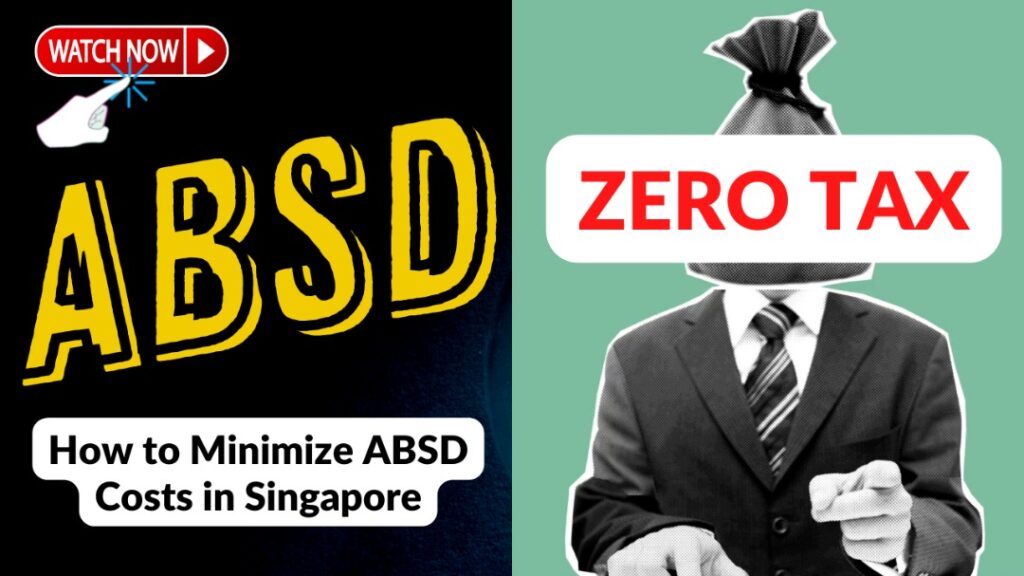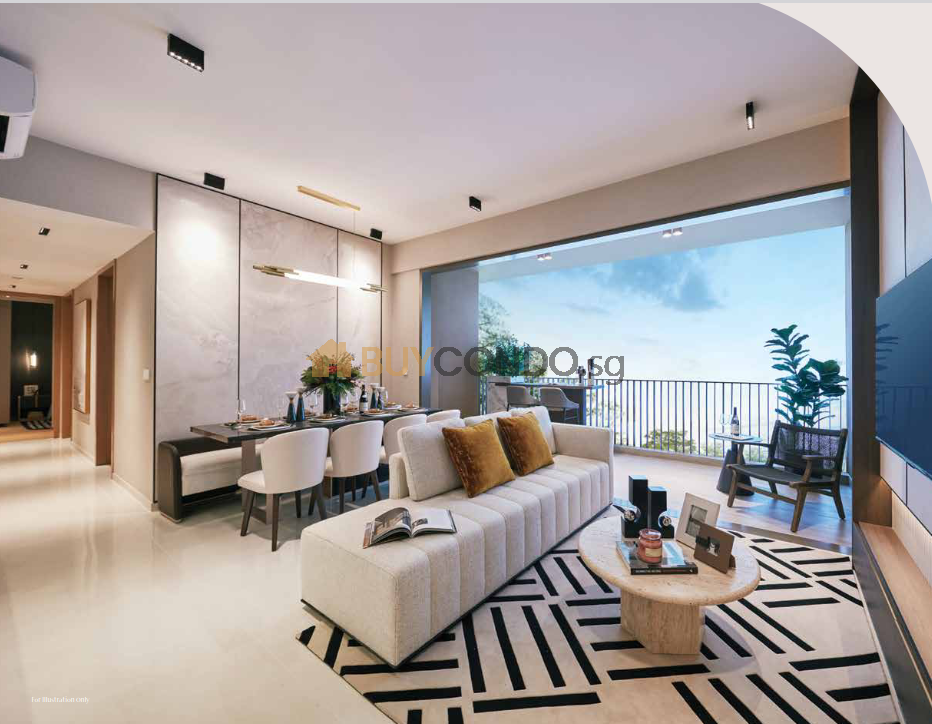4 Methods to Avoid Paying ABSD when Buying Condo in Singapore
(ABSD is ADDITIONAL BUYER STAMP DUTY)

How Proper Planning can help you save in paying Less ABSD, regardless of whether you’re a Singapore Citizen, PR, Or Foreigner. This is right for You.
With the recent cooling measures implemented, there was an increase in ABSD with properties purchased on or after 16th Dec 2021.
– For Singapore citizens, There is no need to pay any ABSD on their first property for Singapore citizens, but it will be 17% ABSD on their second property and 25% on their third or subsequent property purchase.
– For Singapore Permanent Residents need to pay 5% ABSD on their first property purchase, 25% per cent on their 2nd property and 30% for the third and subsequent purchase.
– For Foreigners will need to pay 30% ABSD on all property purchases.
– Lastly, Entities such as corporate companies will have to fork out 35% ABSD on all property purchases.
So how should we Minimize the ABSD Cost that we need to pay in buying property LEGALLY?
You can kick start with these 4 methods:
Buying a property under single ownership so that the spouse can buy another under their own name.
– Although this topic is common, it’s straightforward, direct, and 100% guaranteed works. For example, husband and wife each purchase a property under their name. So legally, they can two properties without paying ABSD. Short & simple, right!
In the case of an HDB or Executive condominium, you can choose to list your spouse as an occupier instead of a co-owner. Once you fulfil the five years (MOP), the occupier can purchase a property.
– However, in the eyes of the Law, only the listed owner has the legal obligation to pay the monthly mortgage. Therefore, you would have to plan ahead on the repayment and financial obligation and monthly bills for each party.
For this to work please bear in mind:
– Only CPF Ordinary Account funds of the listed owner can be used.
– The sole owner must meet the income requirements to qualify for the home loan
– For brand new executive condominiums and HDB flats, the mortgage servicing ratio for loan repayments cannot exceed 30% of the sole borrower’s gross monthly income.
– For private properties and resale executive condominiums, the home loan – plus all existing debt obligations – cannot exceed 55% of the sole borrower’s gross monthly income or what we call it the total debt servicing ratio.
– If both spouses have a similar income, we will usually advise the younger spouse to hold the higher value property, which will help when it comes to refinancing options such as property gearing after two years of the purchase.
If you Already Owned a property under ( Joint Ownership or Tenancy in Common)
You can buy over your spouse’s share and free up your name from the title deed, also known as Decoupling.
Decoupling
– Decoupling sounds like a big word, but simply, it is the removal of 1 owner from the property through the “buy out” by the other party. One co–owner buys or sells their share of ownership to the other co-owner(s).
So legally, only one owner in 1 title deed, only then they will be counted as a first-time homebuyer.
Do note that Decoupling does not apply to HDB owners with effect from 4th May 2016 unless you have a special case to appeal to HDB, subject to their approval.
– Some other terms used are known as part-sale or part purchase too. Which will require buying out the share portion and doing a new bank loan. Other considerations such as CPF outlay used and accrued interest if any.
– I would suggest having workout the sums carefully for the Decoupling method. It may not be suitable for all couples, and it comes to some risk factors involved. Decoupling will incur higher legal costs due to the complexity.
– Couples can also buy a condo under tenants-in-common. This method allows you to split property ownership so that both incomes can support the home loan application, and both parties’ CPF Ordinary Account funds can be used for the down payment and ongoing mortgage instalments.
However, the Pre-Requisition is :
– You must have sufficient cash/CPF to return the exiting party’s CPF used plus accrued interest (Unless you have obtained a written reply by CPF that allows a waiver of this refund.)
– You must also have sufficient income to take over the full loan single-handedly.
Buying Under a Property Trust for children below 21 years old
– Buying Under Trust is just like buying a Legacy for your descendants. Some call this method for the cash-rich as No housing loan, or CPF usage is allowed.
– You can set up a property trust for your child below 21 years old and buy a property under it with you as the Trustee. Legally speaking, the property you purchase is not “yours”; it belongs to the beneficiary (your child). This means you are not legally the property owner; it does not add to your property count.
If you were to buy a second home with this method, you wouldn’t be subject to ABSD. You need to be prepared to part away from the money for the future planning for your child and any actions you act for such for the interest of your child and not for your own benefit.
– A trustee takes legal ownership of the assets held by a trust and assumes fiduciary responsibility for managing those assets and carrying out the purposes of the Trust.
– The Trustee should make a habit of keeping all the receipts and records of the payments they make. A trustee should know that all the income coming from the property, whether it be rents or any sales, are the property of the beneficiary. A trust account should be opened in a reputed bank so that all the transactions can be easily made, monitored, and checked by the Trustee. However, bear in mind that the final accounts belong to your child but not you.
You might wonder when does the Trust end?
– The Trust ends when the child is of the legal age, i.e., 21 years old.
– Once, the Trust ends, the child is now the complete owner of the property, including all of its taxes and mortgages. Of course, once reach the legal age, the child has the right to sell the property and decide on his own. Do not need to seek any approval, full ownership.
– The actual owner of the property is the beneficiary and not the Trustee. So, using the trust method, you can buy property for anyone as young as a toddler or right after the baby is born at birth.
– Another advantage of a trust is that since the courts regards the child as the beneficiary, if the parents or Trustee should become bankrupt many years after the Trust is created, the child’s ownership is safe from the parents’ creditors. The parents would not be able to act as trustees but some other relative could step it.
– Note that under the Bankruptcy Act, any gifts within 5 years of a person becoming bankrupt might be cancelled by the relevant bankruptcy official (usually the Official Assignee).
Buying a property in the name of someone that you can entrust with. (Such as your Family or Relative that is already in the workforce.)
– Relative or family members may have a good stable income but may not be willing to part with the vast 25% down payment or stamp duty. So that’s when you strike an agreement to buy a condo in their name in the title deed, whereby you can be contributing to the cash part for the down payment and monthly repayment.
– Only applicable for first-time home Singaporean home buyers, with NO ABSD.
But there are some other Considerations you might be aware of :
If your relative is planning to get married and buy a condo as their Matrimonial home, it may affect their family planning in the future.
– If your relative is planning to buy a Build to Order (BTO) flat or Executive Condominium, they would have to dispose of the private property at least 30 months before their application, so advanced planning is required.
– In Trust, your child is the legal owner of the property; they can sell it, use it as collateral for a loan, call the shots on who stays in it, etc. Some real-life cases can result in ugly family disputes or even escalate to court cases.
So, which method works best for you? There isn’t a single best method, and it depends on your financial situation and risk appetite in life. Advanced structuring strategies consist of layering methods in different orders to help investors own more properties, obtain higher financing, and save on tax and expenses.
However, it is a more in-depth analysis and customized plan for different needs that we may not be able to explain through article or video.
If you do need advice on such matters, feel free to contact us right now to get a free consultation call.
We make buying and selling a property in Singapore easy and seamless.
Also read up on ABSD refund and subscribe to our YouTube Channel: https://www.youtube.com/watch?v=jOW55_AlTiY
Also can subscribe to our Youtube Channel:
https://www.youtube.com/watch?v=jOW55_AlTiY













